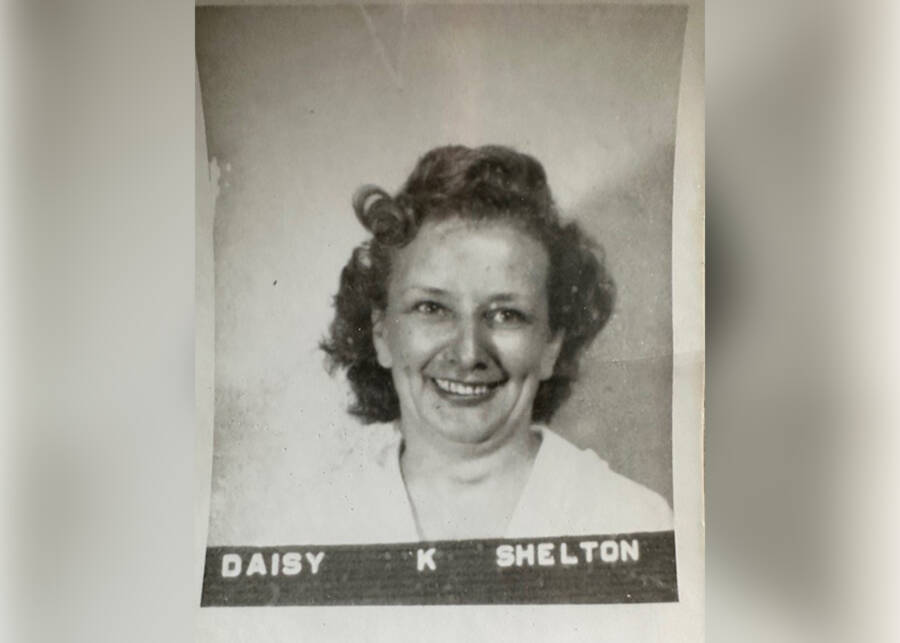After 60 years, Daisy Shelton’s family finally has the answer to who brutally murdered her in 1963.

Miami County Sheriff’s OfficeDaisy Shelton, the Dayton mother who was found brutally murdered.
In June 1964, a fisherman in Tipp City, Ohio discovered a severed human arm in a gravel pit. In the following days, more dismembered body parts appeared in waterways in the surrounding area.
Police identified the parts as belonging to 43-year-old Daisy Shelton, but could not identify her killer. For nearly 60 years, the murder went unsolved. Now, a surprise confession from a witness to the crime has blown the case wide open.
Evidence Of A Brutal Murder
In June 1964, fishermen in the Dayton, Ohio area began discovering severed human remains in waterways. The first discovery was an arm, and then a torso, followed a leg and a head.
The police’s extensive investigation led to them positively identify the remains as those of Daisy Shelton, a middle-aged mother from Dayton. Shelton lived off Springfield Street and worked at Delco, an automotive electronics corporation.
According to a missing persons report filed by Shelton’s daughter, Rita, Shelton was last seen in late August 1963.
Shelton reportedly left the house that evening, telling her daughter that she would soon return home to her 4600 Springfield Street address. But she never came home.
For decades, this was all the evidence police had, and the case went cold — until an unnamed witness made a surprising confession in 2017.
An Eyewitness Cracks Open The Case
In 2017, a hospitalized man, believing he was close to death, confessed to a nurse that he had once witnessed a brutal murder.
Hospital staff informed law enforcement, and soon police officers came to interview him. The man stated that he witnessed another man beat Daisy Shelton over the head with a hammer at a home on Springfield Street. The killer then dismembered her body and scattered the remains in various waterways in Tipp City.
The suspect the witness named was a man who lived on the same street as Shelton. He also worked with her at Delco.
In his interviews with police in 2017, the suspect admitted that he knew Shelton. And, although he was cooperative, he made a few statements that alarmed the police.
The suspect told authorities that his DNA was likely to be on a box in which police found some of Shelton’s remains. He stated that the box came from his home, and that Shelton’s murderers probably killed her there.
“He admitted he looked guilty and could possibly be convicted in court,” the Miami County Sheriff’s Office stated, according to the Dayton Daily News.
Police moved forward with prosecuting the suspect, but he unfortunately died in September 2022 at the age of 92. The witness to the crime also gave testimony to a grand jury, but likewise died before the case could be prosecuted.
For Shelton’s granddaughter, Maria Walling, the news that the suspect had died was bittersweet. She was happy she finally had answers, but her grandmother still did not have justice.
Walling also learned that police identified three men who were likely involved in her grandmother’s death. All three died before the case went to court.
“I’m like finally. They found the killers, there were three,” Walling told WHIO News. “I’m going to feel bad for the families [of these three individuals] who are going to find out [about how they] killed my grandmother.”
And while the family has answers to who killed Daisy Shelton, police have yet to confirm a motive.
“Cold case homicides are among the most difficult investigators confront, but the Miami County Sheriff’s Office remains dedicated to pursuing all open cases,” the sheriff’s office stated, according to Dayton Daily News. “Revisiting cases is a crucial aspect of bringing a sense of justice to the victim’s family, even if it comes long after the crime occurred. Concluding cases even under these circumstances allows an investigation to be released for public interest and makes information available to the victim’s family.”